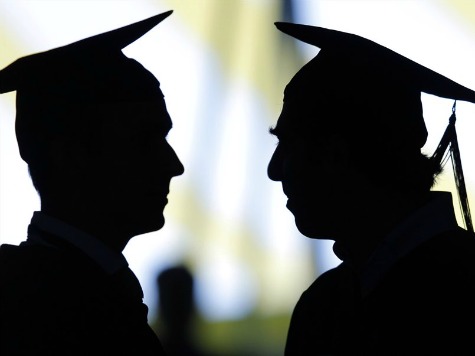The Atlantic has published a piece championing the way college debating has been changed with the advent of ignoring the stated resolution and deciding that the subject to be debated should revolve around one’s own personal experience.
The piece states that the time-honored practice of arguing for or against government policies was “tame, predictable, and, frankly, boring.” The Atlantic asserts, “No more.”
The author mentions the 2014 Cross Examination Debate Association (CEDA) Championships at Indiana University, where two black women from Towson University, Ameena Ruffin and Korey Johnson, won the tournament. Instead of debating the stated resolution, which asked whether the U.S. president’s war powers should be restricted, the duo changed the subject of the debate to how the U.S. government was hostile to poor black communities.
The final round featured Ruffin and Johnson against Rashid Campbell and George Lee from the University of Oklahoma, two black men. The debate was conducted with terms such as “nigga authenticity” and speaking techniques that included hip-hop and spoken-word poetry. The usual rules of decorum were discarded; when time ran out on Lee’s rebuttal, he refused to yield and yelled, “F*** the time!” Campbell decided to use his personal experience of being treated badly by the police as supporting evidence.
Only one year before, at the 2013 championship, the winners, two black men from Emporia State University, Ryan Walsh and Elijah Smith, also based their strategy on ignoring the stated resolution and attacked the basic framework of collegiate debate, asserting that the format had historically given the edge to straight, white, middle-class students.
Joe Leeson Schatz, Director of Speech and Debate at Binghamton University, loves the participants ignoring the historic rules that governed debate. He said, “Finally, there’s a recognition in the academic space that the way argument has taken place in the past privileges certain types of people over others. Arguments don’t necessarily have to be backed up by professors or written papers. They can come from lived experience.”
But Aaron Hardy, who coaches debate at Northwestern University, disagreed, contending:
We end up… with a large percentage of debates being devoted to arguing about the rules, rather than anything substantive… Judges have been very angry, coaches have screamed and yelled. People have given profanity-laced tirades, thrown furniture, and both sides of the ideological divide have used racial slurs.
The Atlantic admits that all the basic skills needed for a career in law or business are being discarded, writing:
Indeed, to prevail using the new approach, students don’t necessarily have to develop high-level research skills or marshal evidence from published scholarship. They also might not need to have the intellectual acuity required for arguing both sides of a resolution.
Because the two major debate associations, CEDA and the National Debate Tournament (NDT), are governed by the students and lack stringent enforcement, Hardy and his supporters attempted to create a “policy only” kind of tournament to be scheduled in March. Fourteen schools signed up, but they were savaged on Facebook and other online sites by those accusing them of creating a space for mostly white teams from elite universities. The tournament was canceled, ostensibly because there were logistical issues, but Hardy noted a “toxic climate” has intimidated even “strong supporters of ‘policy debate'” from “publicly attach[ing] their name to anything that might get them called racist or worse.”
Korey Johnson argued against Hardy’s idea, saying, “Separating debate is a bad move. With the increase in minority participation came a range of different types of argument and perspectives, not just from the people who are in debate, but the kind of scholarship we bring in.” Ameena Ruffin echoed, “For them to tell us that we can’t bring our personal experience, it would literally be impossible. Not just for black people – it is true of everyone. We are always biased by who we are in any argument.”
UC Hastings Law School professor Osagie Obasogie, who teaches critical race theory, also chimed in with his perspective that the traditional debate format was racist: “Various procedures – regardless of whether we’re talking about debate formats or law – have the ability to hide the subjective experiences that shape these seemingly ‘objective’ and ‘rational’ rules. This is the power of racial subordination: making the viewpoint of the dominant group seem like the only true reality.”
Hardy takes issue with that view. He said, “Having minimal rules is not something that reflects a middle-class white bias. I think it is wildly reductionist to say that black people can’t understand debate unless there is rap in it – it sells short their potential.” His answer is to set up a nonprofit organization to fundraise for minority scholarships.
Korey Johnson concluded, “No matter how people feel about my argument, they have to listen to me for all of my speeches, everything I have to say; they can’t make me stop speaking.”

COMMENTS
Please let us know if you're having issues with commenting.